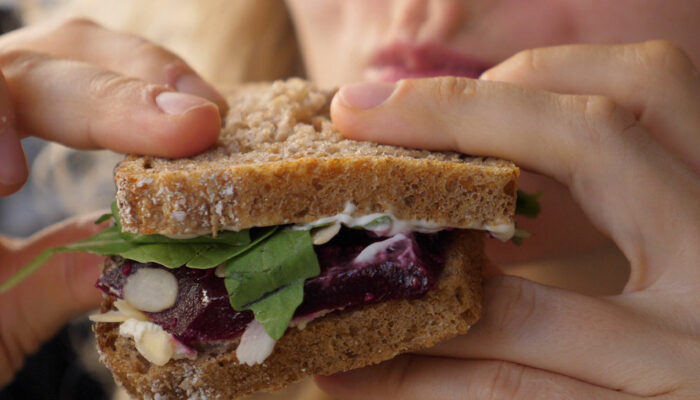12 healthy snack ideas for managing cholesterol

A healthy lifestyle is the first step toward ensuring overall well-being. This requires prioritizing health even amid busy schedules. However, approximately two in five adults in the country are dealing with high cholesterol. Here, a meal plan comprising all essential nutrients, combined with an active lifestyle, plays an integral role in preventing diseases. So, here are some healthy, easy-to-make snacks that one can add to their daily meals when dealing with high cholesterol:
Tofu and vegetable sandwich
Studies have shown that having about 25 grams of soy protein a day can lower LDL cholesterol levels by 5 to 6%. Tofu, which is made of soy, is an excellent vegan source of protein and can help provide the body with the required energy levels. Moreover, vegetables like carrots, broccoli, and Brussels sprouts are rich sources of soluble fiber, which aids digestion and has cholesterol-lowering properties. So, whole-grain bread slices stuffed with tofu, vegetables, and a few spoonfuls of lentils or sprouts make for a scrumptious breakfast that can help manage cholesterol levels.
Sprouts salad
In addition to being crunchy, delectable, and easy to prepare, sprouts are packed with proteins, iron, vitamin C, folate, magnesium, and other essential nutrients. A regular intake of sprouts can help lower LDL cholesterol levels and manage blood sugar. One may prepare a salad comprising sprouts they like (sprouted black beans, kidney beans, moth beans, and black-eyed beans) and salad vegetables (i.e., carrots, cucumbers, and chopped spinach). An olive oil dressing can enhance the salad’s flavors and increase its nutritional value.
Oatmeal and nut cookies
Loaded with soluble fiber, iron, amino acids, zinc, and selenium, oatmeal is the perfect way to start the day. Further, tree nuts like almonds and walnuts are rich in omega-3 fatty acids, which help lower bad cholesterol. So, delicious oatmeal and nut cookies can serve as perfect healthy snacks to lower cholesterol and are great alternatives to processed and deep-fried foods. One should avoid using refined flour to bake the cookies, replacing it with whole wheat flour (when not intolerant or sensitive to gluten), almond flour, coconut flour, or buckwheat flour. Chopped dates or figs may be added as natural sweeteners to replace refined sugar.
Fruit salad
Fruits such as apples, grapefruits, bananas, oranges, and cranberries are great sources of pectin, which can lower LDL cholesterol levels by up to 16%. So, a bowl of assorted fruits, including seasonal ones, can replenish the body with vital nutrients and help prevent and manage high cholesterol.
Unsalted popcorn
Contrary to popular belief, popcorn is a fiber-rich snack low in calories and ideal for people with high blood cholesterol. However, store-bought popcorn typically contains large amounts of salt, butter, and spices, making it highly processed and unhealthy. So, one should try to make plain popcorn at home and enjoy it as an evening snack or while watching a series on the weekend.
Baked eggplant chips
Eggplants are rich in chlorogenic acid, an antioxidant that has been shown to lower LDL cholesterol levels. Baked eggplant chips are excellent alternatives to deep-fried chips, especially when served with a delectable dip containing Greek yogurt, garlic, and sliced cucumber. Here, one can drizzle extra virgin olive oil on the eggplant slices and bake them for approximately 20 minutes or till crisp and golden.
Vegetable fingers and hummus
Chickpeas are rich in fiber and polyunsaturated fats and low in sodium, being the best healthy snacks to lower cholesterol levels. Hummus is a great way to incorporate chickpeas into the meals. Moreover, diced vegetables like carrots and cucumbers served with hummus as a dop can make for a filling and scrumptious snack for managing cholesterol levels.
Avocado toast
Avocado is rich in monounsaturated fats and several nutrients, including folate, niacin, magnesium, vitamins, and potassium, which can help lower cholesterol. Further, studies have shown that two servings of avocado per week can reduce the susceptibility to heart problems. Owing to its buttery taste and texture, avocado can be spread over toast to make for a filling and nutritious snack or breakfast option. However, one must remember to prepare this toast using whole-wheat or multigrain bread instead of white bread.
Roasted fox nuts
Fox nuts are packed with potassium and healthy carbohydrates, which can help control triglyceride and cholesterol and prevent cardiovascular diseases. Roasted, unsalted, unspiced fox nuts are healthy munchies and suitable replacements for processed snacks like chips and baked desserts.
Boiled sweet potatoes
According to research, sweet potatoes can lower LDL cholesterol levels and reduce the risk of heart problems. Sweet potatoes are rich in nutrients like vitamin A, vitamin C, beta-carotene, and potassium. So, boiled sweet potatoes with a dash of lime juice and without salt or spices can be a healthy, filling snack option for those with high cholesterol.
Boiled sweet corn
A study published in the Journal of Nutritional Biochemistry suggests that corn husk oil can help keep cholesterol levels in check and prevent heart conditions. Further, corn can also help manage levels of carbohydrate, protein, and lipid metabolism in the body. Boiled, unsalted sweet corn is the perfect snack for people with high cholesterol. One may season this snack with a dash of lime juice to increase its palatability.
Baked barley chips
Barley contains a soluble fiber called beta-glucan, which helps lower cholesterol levels. It also contains several essential vitamins and minerals, making them healthy alternatives to deep-fried chips. However, these chips should be baked with little to no spices and salt.
In addition to incorporating these healthy snacks into daily meals, one should adopt certain healthy lifestyle practices, such as avoiding processed and store-bought foods, exercising regularly, and staying hydrated. A sedentary lifestyle can increase the risk of high cholesterol and heart problems. So, one should set reminders to move about and stretch for at least 5 to 10 minutes every hour and walk every day to manage cholesterol levels effectively.





